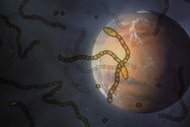Create a free profile to get unlimited access to exclusive videos, sweepstakes, and more!
Space Jam! Freeze-dried mouse sperm returns from ISS some six years later to produce healthy 'space pups'

Have you ever wanted to freeze dry mouse sperm, send it to space for a few years, expose it to space radiation aboard the ISS, bring it back down to Earth, inseminate some lucky lady mice with it, and breed healthy “space pups” happily ever after? Well someone wanted to, and that someone got funding, and now we have space pups and a study. Science!
No, we’re not making any of this up. In 2013, a team of Japanese scientists studying space radiation’s long-term effect on the reproductive normality of deep space mammalian explorers launched mouse freeze-dried spermatozoa to the International Space Station. Apparently you just don’t get the same kind of radiation here on Earth that you do in space, so you have to go to space to test its effects.
According to the study published last week in the journal Science Advances, “Space radiation includes various energetic particles, including solar wind, solar cosmic rays, and galactic cosmic rays, which cannot be reproduced on the ground. Therefore, to determine the effects of space radiation on animals and their offspring, we must use the ISS for long periods of time.”
As such, nearly six years later, a SpaceX cargo capsule nabbed the mouse sperm, and returned the little rodent swimmers back down to their home planet, where, presumably, someone laughing maniacally and wearing a lab coat was waiting with a very small turkey baster. Fast forward a mouse baby shower or two, and the team has proceeded to breed litters of healthy “space pups.”
In order to better determine the long-term effects of space radiation on mammalian sperm, the researchers collected samples from healthy mice on Earth, which were then freeze dried to remove any water. Some samples were aboard the ISS for as few as nine months, others for 1,010 days, and still others for 2,129 days. And another group of samples was kept frozen down on Earth. All told, according to the study, it was the “longest biological preservation experiment using mouse spermatozoa” ever performed on the ISS.
Back on Earth, it came time for rehydration and rodent IVF, using both space jam and the more terrestrial variety. Then came a period where pregnant mice ate pickles and posted Instagram pictures documenting their belly growth, and then came litters of space pups and Earthly pups, for “ground control” comparison’s sake.
And remarkably, comparisons found that the space pups and the ground pups were similarly healthy. Even under a microscope, their DNA appeared identical, and gene expression profiles remained unchanged.
“As a result, we obtained many healthy ‘space pup’ offspring from space-preserved spermatozoa with the same success rate as the ground controls, even after 5 years and 10 months of storage. These space pups did not show any differences compared to the ground-control pups, and their next generation also had no abnormalities,” reads the study.
Granted, the ISS is protected from much of the space radiation by Earth’s magnetic field. So further study, further away is certainly in order before we can make any assumptions about the debilitating powers of deepspace radiation on not just mice, but humans. Still, the team suggests that such an experiment could lead to freeze-drying the sperm of all sorts of animals, in a Noah’s Ark type preservation effort, where samples could be stored buried on the Moon or in the proposed “Gateway” space station being dreamed up as a hub for deep space travel.


























